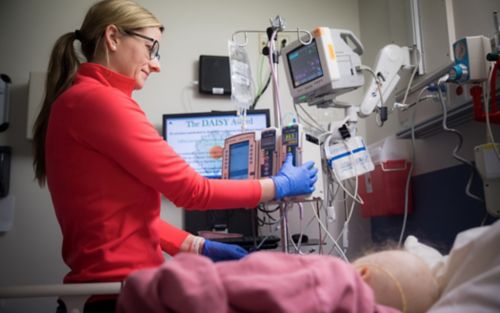When you take a medicine, your body needs a way to handle it. One way your body does this is by using enzymes to break down (metabolize) the medicine. Uridine diphosphate glucuronosyltransferase 1A1 (UGT1A1) is an enzyme that breaks down some medicines. UGT1A1 also removes a substance called bilirubin from your body. Bilirubin is made in the body during the normal breakdown of red blood cells.
UGT1A1 enzymes break down some medicines such as atazanavir and a chemotherapy medicine called irinotecan.
How pharmacogenomic testing works
Each person differs from another at the DNA level. Genes are segments of DNA that act as a set of instructions and tell the body how to work. The UGT1A1 gene is a section of DNA that instructs how well UGT1A1 enzymes will work.
The study of how genes like UGT1A1 affect the way your body interacts with medicines is called pharmacogenomics. Differences in your DNA that make up the UGT1A1 gene can affect how well you are able to break down some medicines. If you break down a medicine too fast or too slow, the medicine may not work as well, or you may have more side effects.
A pharmacogenomic test looks for differences that can help your medical team know how well your UGT1A1 enzyme will work. The test results can help your doctor and pharmacist choose the correct type or dose of medicine to give you.
Please share your pharmacogenomic test results with all your new doctors and pharmacists.
After pharmacogenomic testing
The results of your UGT1A1 test will place you into 1 of 3 UGT1A1 gene groups:
Normal UGT1A1 function: People in this group have normal working UGT1A1 enzymes. About 43% (43 in 100) people are in this group.
Intermediate UGT1A1 function: People in this group have slightly lower than normal UGT1A1 enzyme function. About 44% (44 in 100) people are in this group.
Poor UGT1A1 function: People in this group have much lower UGT1A1 function. This result is linked to Gilbert syndrome. About 13% (13 in 100) people are in this group.
Scientists continue to find new information about which medicines are affected by genes. Talk to your doctor or pharmacist if you have questions about your medicines, side effects, or pharmacogenomic testing.
Find more information about genes that are being used to make medication therapy decisions for patients at Jude.
If you have questions about pharmacogenomic testing done at St. Jude, you can email the Clinical Pharmacogenomics Program at pharmacogenomics@stjude.org.



